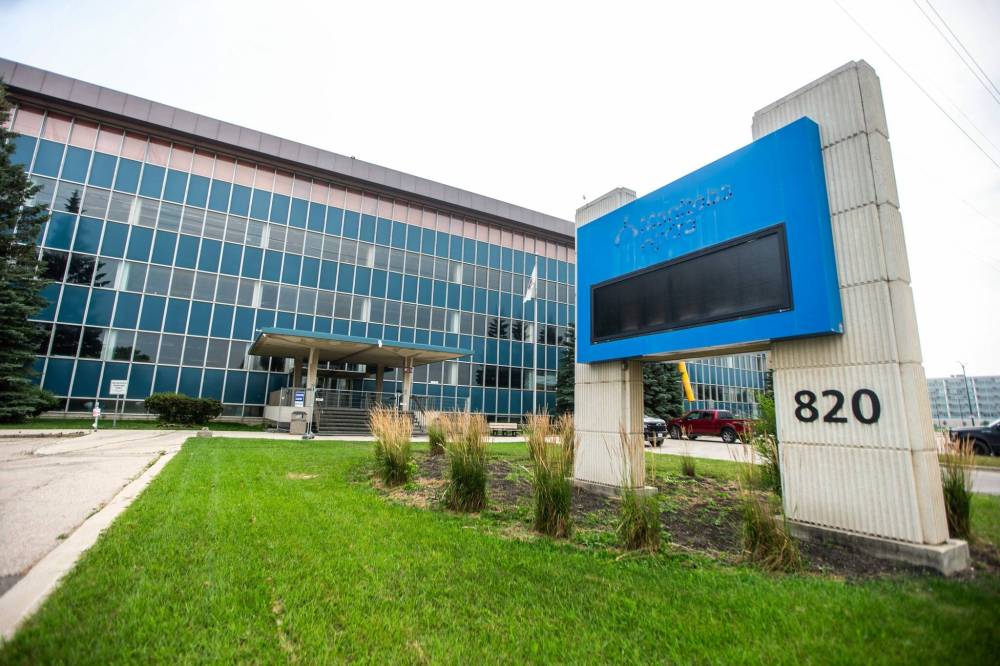The former headquarters of Manitoba Hydro will become a space for members of Norway House Cree Nation to get medical care, conduct business meetings and receive support for their children.
Interior renovations have begun on the 200,000-square-foot building at 820 Taylor Ave., which was purchased by Norway House in 2023 after a year of negotiations.
Plans for the $40-million project include a one-stop wellness shop for members of the northern community and other Indigenous people. The building will include medical, dental and pharmacy offices, a 5,000-square-foot conference space, a 4,000-square-foot daycare and offices for Norway House Child and Family Services and Jordan’s Principle.

MIKAELA MACKENZIE / FREE PRESS
Interior renovations have begun on the 200,000-square-foot building at 820 Taylor Ave., which was purchased by Norway House in 2023 after a year of negotiations.
The building will be named Norway House Cree Nation Embassy because the goal is to create an “amenity-rich” home in Winnipeg for the reserve’s nearly 10,000 members, around 2,000 of whom live in Winnipeg, said Joel Jackson, the project manager for the re-development.
“It’s huge project for Norway and it really gives them a spot on the map in Winnipeg, as far as property and development…,” he said Monday. “It’s a very big deal.”
Norway House residents regularly come to Winnipeg to receive medical care and the community charters its own bus twice a week for people coming into the city.
The community wants to receive care being handled by its own people, Jackson said.
“It’s an embassy in Winnipeg that the band members can come to and feel at home,” Jackson said.
The first phase of the building will open to residents in January 2026, with a full opening slated for 2027.
Norway House Chief Larson Anderson said the building was purchased for about $12 million, and the band has spent about $2 million on the project so far.
It sits on a sprawling nine acres of land. Discussions on how to use all of that space have begun, Anderson said.
The band owns a four-storey building at 333 Maryland St. to house members in Winnipeg for medical care but the First Nation has quickly outgrown that space, Anderson said.
“We do try to be there for all our members, which are on or off reserve, but it’s a little bit difficult to do that when you don’t have a proper facility,” he said.
As it develops the former Hydro headquarters, Norway House is also investing in its future.
In May, the First Nation purchased the Mainstay Suites hotel at 670 King Edward St. for $20 million.
Anderson said leaders in the community have been focusing on investments after being in “pretty bad financial shape.”
The First Nation is also working to open band-owned stores in Norway House, said Anderson, who has accused the North West Company, which owns a chain of stores across Manitoba First Nations, of holding an unfair monopoly in the community.
“There’s a huge problem with First Nations economies and that is that we don’t have enough money… circulating within our nation,” he said.
Anderson said Norway House’s struggles with the environmental and economic impact of Manitoba Hydro development — which he called the “biggest nemesis in the North” — make the acquisition more meaningful.
Northern communities have long sounded the alarm on Manitoba Hydro’s environmental and societal impact on First Nations.
Flooding caused by a hydroelectric dam built in 1968 forced people from Chemawawin Cree Nation to relocate to Easterville.
In 2023, Mathias Colomb Cree Nation sued Manitoba Hydro, alleging its way of life had been irreparably damaged by the Laurie River hydroelectric dams.
“We’ve got thousands of stories about how badly things have gone up north with the development of Hydro from the 1960s to now,” he said. “So this gives us a sense that we’re getting something back that we lost and that would be a sense of pride as a community.”
malak.abas@freepress.mb.ca

Malak Abas
Reporter
Malak Abas is a city reporter at the Free Press. Born and raised in Winnipeg’s North End, she led the campus paper at the University of Manitoba before joining the Free Press in 2020. Read more about Malak.
Every piece of reporting Malak produces is reviewed by an editing team before it is posted online or published in print — part of the Free Press‘s tradition, since 1872, of producing reliable independent journalism. Read more about Free Press’s history and mandate, and learn how our newsroom operates.
Our newsroom depends on a growing audience of readers to power our journalism. If you are not a paid reader, please consider becoming a subscriber.
Our newsroom depends on its audience of readers to power our journalism. Thank you for your support.